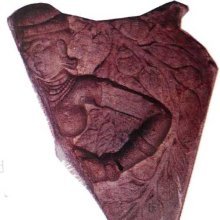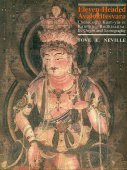Yakshi, Yakṣi, Yakṣī: 10 definitions
Introduction:
Yakshi means something in Buddhism, Pali, Hinduism, Sanskrit, Jainism, Prakrit, Tamil. If you want to know the exact meaning, history, etymology or English translation of this term then check out the descriptions on this page. Add your comment or reference to a book if you want to contribute to this summary article.
The Sanskrit terms Yakṣi and Yakṣī can be transliterated into English as Yaksi or Yakshi, using the IAST transliteration scheme (?).
Images (photo gallery)
(+5 more images available)
In Hinduism
Purana and Itihasa (epic history)
Source: archive.org: Puranic EncyclopediaYakṣī (यक्षी).—(YAKṢIṆĪ). Women folk of Yakṣas. Agni Purāṇa, Chapter 50 mentions that the images of Yakṣī to be installed in temples should have fixed and long eyes. Mahābhārata, Vana Parva, Chapter 54, Verse 105, states that Yakṣiṇī is a Devī and by eating the prasāda (naivedya) of the Devī one would be absolved of the sin of Brahmahatyā (killing a Brāhmaṇa).
Source: Cologne Digital Sanskrit Dictionaries: The Purana Index1) Yakṣi (यक्षि).—Women of the Yakṣas.*
- * Bhāgavata-purāṇa X. 90. 9.
2) Yakṣī (यक्षी).—One of the ten pīṭhas for images with three mekhalas; this gives one plenty of cows.*
- * Matsya-purāṇa 262. 6, 8, 17.
Yakṣī (यक्षी) refers to the name of a Tīrtha (pilgrim’s destination) mentioned in the Mahābhārata (cf. ). Note: The Mahābhārata (mentioning Yakṣī) is a Sanskrit epic poem consisting of 100,000 ślokas (metrical verses) and is over 2000 years old.

The Purana (पुराण, purāṇas) refers to Sanskrit literature preserving ancient India’s vast cultural history, including historical legends, religious ceremonies, various arts and sciences. The eighteen mahapuranas total over 400,000 shlokas (metrical couplets) and date to at least several centuries BCE.
Shaktism (Shakta philosophy)
Source: Google Books: ManthanabhairavatantramYakṣī (यक्षी) refers to one of the eight Yoginīs (yoginī-aṣṭaka) associated with Kāmākhya (corresponding to the eastern face of Bhairava), according to the Manthānabhairavatantra, a vast sprawling work that belongs to a corpus of Tantric texts concerned with the worship of the goddess Kubjikā.—[...] The eight Yoginīs (yoginyaṣṭaka): Viśālā, Pārthivā, Yakṣī, Dhūrjaṭī, Viṣabhakṣaṇī, Sarvasiddhipradā, Tuṣṭi, Icchā, Siddhipradāyakī.

Shakta (शाक्त, śākta) or Shaktism (śāktism) represents a tradition of Hinduism where the Goddess (Devi) is revered and worshipped. Shakta literature includes a range of scriptures, including various Agamas and Tantras, although its roots may be traced back to the Vedas.
In Buddhism
Tibetan Buddhism (Vajrayana or tantric Buddhism)
Source: academia.edu: The Structure and Meanings of the Heruka MaṇḍalaYakṣī (यक्षी) is the name of a Ḍākinī who, together with the Vīra (hero) named Yakṣa forms one of the 36 pairs situated in the Agnicakra, according to the 10th century Ḍākārṇava chapter 15. Accordingly, the agnicakra refers to one of the three divisions of the saṃbhoga-puṭa (‘enjoyment layer’), situated in the Herukamaṇḍala. The 36 pairs of Ḍākinīs [viz., Yakṣī] and Vīras are red in color; they each have one face and four arms; they hold a skull bowl, a skull staff, a small drum, and a knife.

Tibetan Buddhism includes schools such as Nyingma, Kadampa, Kagyu and Gelug. Their primary canon of literature is divided in two broad categories: The Kangyur, which consists of Buddha’s words, and the Tengyur, which includes commentaries from various sources. Esotericism and tantra techniques (vajrayāna) are collected indepently.
In Jainism
General definition (in Jainism)
Source: archive.org: The Jaina IconographyYakṣī (यक्षी) or Yakṣiṇī together with the Yakṣa compose the Śāsanadevatās or “attending deities” of the Tīrthaṃkaras.—“A Yakṣa is a devotee of the Tīrthaṃkaras”, so defines a Jaina liturgical text. According to the Jaina belief, Indra appoints one Yakṣa and Yakṣī to serve, as attendants of each Tīrthaṃkara. The Yakṣa would be on his right side and Yakṣiṇī on his left. Thus, they also came to be called Śāsana-devatā or attendant spirits. According to Hemacandra, a Yakṣa originates from the particular religious spirit of a Jina. Hence, we can take, in all strong probability, that the Yakṣa was the leader of the disciples and Yakṣiṇī was the first female convert.

Jainism is an Indian religion of Dharma whose doctrine revolves around harmlessness (ahimsa) towards every living being. The two major branches (Digambara and Svetambara) of Jainism stimulate self-control (or, shramana, ‘self-reliance’) and spiritual development through a path of peace for the soul to progess to the ultimate goal.
Languages of India and abroad
Sanskrit dictionary
Source: Cologne Digital Sanskrit Dictionaries: Monier-Williams Sanskrit-English Dictionary1) Yakṣī (यक्षी):—[from yakṣa > yakṣ] a f. a female Yakṣa, [Mahābhārata; Rāmāyaṇa] etc. (yakṣīṇām prathamā yakṣī = durgā, [Harivaṃśa])
2) [v.s. ...] Name of Kubera’s wife, [cf. Lexicographers, esp. such as amarasiṃha, halāyudha, hemacandra, etc.]
3) [from yakṣ] b f. of yakṣa above.
Source: DDSA: Paia-sadda-mahannavo; a comprehensive Prakrit Hindi dictionary (S)Yākṣī (याक्षी) in the Sanskrit language is related to the Prakrit word: Jakkhī.
Sanskrit, also spelled संस्कृतम् (saṃskṛtam), is an ancient language of India commonly seen as the grandmother of the Indo-European language family (even English!). Closely allied with Prakrit and Pali, Sanskrit is more exhaustive in both grammar and terms and has the most extensive collection of literature in the world, greatly surpassing its sister-languages Greek and Latin.
Kannada-English dictionary
Source: Alar: Kannada-English corpusYakṣi (ಯಕ್ಷಿ):—
1) [noun] a female belonging to the class of demi-gods Yakṣas.
2) [noun] a wife of a demi-god of this class.
3) [noun] a wife of Kubēra, the chief of this class.
4) [noun] a woman skilled in black-magic and supposedly having supernatural power by a compact with the devil or evil spirits; a witch.
5) [noun] (jain.) a class of demi-goddesses.
Kannada is a Dravidian language (as opposed to the Indo-European language family) mainly spoken in the southwestern region of India.
Tamil dictionary
Source: DDSA: University of Madras: Tamil LexiconYakṣi (யக்ஷி) noun < yakṣī. Female of the yakṣa class. See இயக்கி [iyakki], 1.
Tamil is an ancient language of India from the Dravidian family spoken by roughly 250 million people mainly in southern India and Sri Lanka.
See also (Relevant definitions)
Starts with: Yakshika, Yakshin, Yakshini, Yakshinigara, Yakshinikavaca, Yakshinimantra, Yakshinimantrasadhana, Yakshinipadma, Yakshinipatala, Yakshinisadhana, Yakshinisiddhi, Yakshinitantra, Yakshinitirtha, Yakshinitva, Yakshinivetalasadhana, Yakshinividya, Yakshinividye, Yakshitva.
Ends with: Kudryakshi, Kuvalayakshi, Madhuyakshi, Mahayakshi, Matsayakshi, Matsyakshi, Pratyakshin, Ramyakshi, Shakulyakshi, Shalishushkabharajyakshi, Tryakshi, Vadhuyakshi.
Full-text (+30): Yakshitva, Yaksha, Vidyunmala, Jakkhi, Icakki, Yakshini, Shyamavarta, Mahayakshi, Iyakki, Maholukhalamekhala, Ciriyakki-palan-calakaiaccu, Vandya, Yakki-accu, Abhishastipavan, Jvalamalini, Padmavati, Mahayaksha, Sarvasiddhiprada, Dhurjati, Kushmandini.
Relevant text
Search found 36 books and stories containing Yakshi, Yakṣi, Yakṣī, Yaksi, Yākṣī, Yagshi; (plurals include: Yakshis, Yakṣis, Yakṣīs, Yaksis, Yākṣīs, Yagshis). You can also click to the full overview containing English textual excerpts. Below are direct links for the most relevant articles:
Amaravati Art in the Context of Andhra Archaeology (by Sreyashi Ray chowdhuri)
Tree nymphs in Amarāvatī art < [Chapter 5 - Impact of Amarāvatī Art]
Resemblance to Mathurā art < [Chapter 5 - Impact of Amarāvatī Art]
Buddhist sculptural art < [Chapter 5 - Impact of Amarāvatī Art]
Garga Samhita (English) (by Danavir Goswami)
Verse 2.19.38 < [Chapter 19 - The Rāsa-dance Pastime]
Verse 2.18.35 < [Chapter 18 - The Sight of Śrī Kṛṣṇacandra]
Verse 8.9.5 < [Chapter 9 - Lord Balarāma’s Rāsa Dance]
Jainism in Odisha (Orissa) (by Ashis Ranjan Sahoo)
Ambika images (Koraput) < [Chapter 3: Survey of Jaina Antiquities in Odisha]
Jaina Remains at Jamunda Village < [Chapter 3: Survey of Jaina Antiquities in Odisha]
Jaina Sculptures at Achutrajpur < [Chapter 3: Survey of Jaina Antiquities in Odisha]
Rig Veda (translation and commentary) (by H. H. Wilson)
Ramayana (by Manmatha Nath Dutt)
Chapter XXV < [Book 1 - Bāla-kāṇḍa]
Chapter XXVI < [Book 1 - Bāla-kāṇḍa]
Chapter XVII < [Book 1 - Bāla-kāṇḍa]
Later Chola Temples (by S. R. Balasubrahmanyam)
Temples in Kovilangulam < [Chapter II - Temples of Kulottunga I’s Time]
Appendix: Temples or parts thereof built and miscellaneous facts < [Chapter II - Temples of Kulottunga I’s Time]
Related products






